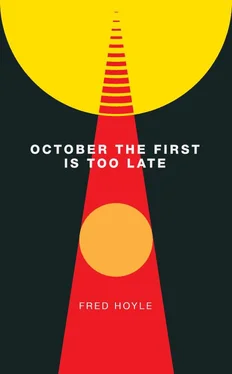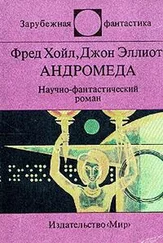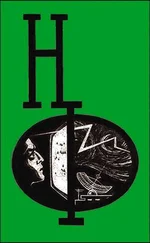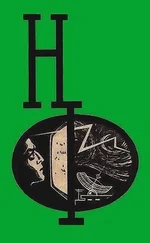We saw the slow steady expansion of one centre after another. The population increased, the technology improved. We saw the people happy and smiling again. We heard them talking in a new language. We saw them attempting to recover the relics and treasures of the past, particularly books and manuscripts. We saw how they made every effort as they improved to absorb the culture of the past. Amazingly, a great deal survived.
By now we were almost a thousand years on. The new civilization was becoming exuberant. There was nothing of the deathly, machine-like quality of the situation before the first upheaval, the Great Disaster as it came to be known. People were individuals again. There was hope for the future once more.
The different centres were by now overlapping each other. They were in argument. There was a period of war, astonishingly short it seemed to us on this kaleidoscopic record. The war turned out to be no more than a kind of lubricant that allowed the hitherto separate regions to join up with each other into a coherent whole. With a growing sense of horror I realized it was all going to happen again. There was going to be a second disaster. It became so completely inevitable as one watched. Century after century went by. Each brought its contribution to the elephantine growth. Gone was the zip and zest of the first pioneers of this new civilization. We were back again in a punched-card era. It all happened with horrible predictability. The first and second catastrophes might have been interchanged and you couldn’t have told the difference.
So it was with the reconstruction. We saw it all beginning again. There was a longish sequence belonging to North America, in what used to be the United States. It had a vaguely familiar look about it. John burst out loudly, in contrast to our previous whispers:
‘That’s it, look, that’s it! That’s what we saw, when we flew across America from Hawaii!’
So it was. What we had seen was not the America of the eighteenth century. It was the America of the fourth millennium.
The record was relentless. I could see now why the girls and the white-haired man had not wanted to stay. Added to horror of intimate detail, I had the feeling of a whole species in some monstrous, unclean cycle from which it could never escape. Each cycle was occupying a little less than a thousand years. Always during the reconstruction phase we could see the same bland confidence that this time it would be different. Because these phases were reasonably long drawn out, over three centuries or so, it always seemed as if the disease had been cured. Then quite suddenly, almost in a flash, the monstrous expansion started again. It was a kind of shocking social cancer. Then came the major surgery of flame and death, and so back to endeavour, to a temporary happiness, and to unrequited hope.
Yet at last something different did happen. At last, when it seemed as if extinction had finally come, just two centres managed to survive. They grew to a reasonable and moderate size, and at that they stopped, or almost stopped, for nearly a thousand years. The film became quite detailed. An important point had evidently been reached.
Always when a centre of population expanded from a small beginning the people were far less heterogeneous than the kind of human population we were used to. Now we had a rather uniform situation. Yet there were still the two population centres.
There was no suggestion of war, however. The people, looking much like the people of the future, were restrained and reasonable, they had learnt the lesson of the past. The two centres maintained a quite friendly rivalry, with the aspects of a favourable situation about it. The rivalry seemed to prevent complacency, it seemed to provide an incentive to achievement. Yet as time went by I could detect a slow steady growth in both population groups, caused apparently by the friendly competition between them.
Both groups were quite well aware of what was happening. They noted the growth, yet they decided after considerable thought that the situation could be kept within bounds. So it was for a long time. Quite suddenly, however, control seemed to be lost. There was a stage beyond which expansion simply could not be prevented. This stage was reached before anybody expected it. From then on we watched a wretched society being forced along a road down which it did not wish to travel. It seemed as if everybody knew what was going to happen, yet nobody could prevent it.
‘They’ve got beyond a point of instability. It’s inherent in the organization. They can’t get back.’
John’s prognostication was right. The controlled rivalry disappeared. In its place came an unrestrained rivalry. The groups grew, merged together, after the usual momentary outburst, and so the disease spread to its inevitable conclusion.
At the next re-expansion phase there were three groups. When they reached a very moderate size, about a million people each, discussions took place between them. The outcome was that all three groups merged voluntarily, not to cover the whole Earth, but to contain themselves in a small portion of it. So the people of the future at last appeared. I saw clearly now why they lived in only one place.
How long had they been in their present state? It turned out, upward of a thousand years. In that time strikingly little change had taken place. They believed a genuine stability had at last been achieved, and their belief had more substance to it than the facile, arrogant claims we had seen so often in the earlier parts of the film.
We sat for a long time in silence. There did not seem very much to say. Maybe an hour later, the girls and the white-haired man returned.
‘I think the time has come for us to speak seriously,’ said the man.
I could see something of the appalling predicament that he and his people were in. It was clear the Earth, with its different centres of population, might already be beyond all control. John was evidently thinking along the same lines, for he asked:
‘What plans have you made, about how you’re going to organize the Earth?’
The white-haired man answered simply: ‘We have no such plans, because none are possible.’
The horror of the situation was at last becoming clear to me. It wasn’t so much that we, the remnants of the twentieth-century world, were inevitably condemned to a catastrophic future, with its rhythmic disasters, but that these people, the people of the future, were condemned to return to the agony of the past.
I could see the hopelessness of trying to impose any kind of control. It might last for a few years, even for a few generations, but from what we had seen there could be no permanent stability. Sooner or later the same grotesque swings, from arrogant expansion to pitiful collapse, would occur. It could only be prevented through the gross annihilation of the whole of the past. I had no doubt the technology of these people would enable them to carry through such an annihilation. Yet this was just as impossible as any attempt at control. It would destroy, psychologically, the annihilators. It would be a complete negation of all that these people stood for.
John had been silent for a while, evidently in perturbed thought. Now he asked, surprisingly, ‘Have you seen the situation in Africa and in the southern hemisphere?’
‘Yes, we have made a survey.’
‘What did you find?’
‘Nothing, the same as you.’
‘Isn’t that a bit odd? I know you have elected to live here in this part of the world. But surely some of your people, if only small expeditions, must have explored other parts of the world fairly frequently?’
‘You are wondering why neither you nor we have run into any of our expeditions. The point has not escaped us.’
‘What’s your explanation?’
Читать дальше











